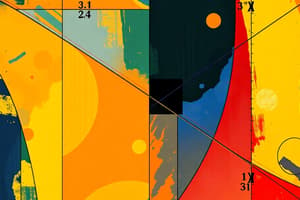Podcast
Questions and Answers
What is a necessary condition for Rolle's theorem to be valid?
What is a necessary condition for Rolle's theorem to be valid?
- f(a) ≠ f(b)
- f(x) is differentiable in the closed interval [a, b]
- f(x) is continuous in the open interval ]a, b[
- f(x) is continuous in the closed interval [a, b] and f(x) is differentiable in the open interval ]a, b[ (correct)
What can be said about the function f(x) if it is constant in the interval [a, b]?
What can be said about the function f(x) if it is constant in the interval [a, b]?
- The function is increasing at x = a
- The function has a minimum value at x = a
- f'(x) = 0 for all x ∈ [a, b] (correct)
- The function has a maximum value at x = c
What happens to the function f(x) as x takes values slightly greater than a, according to Rolle's theorem?
What happens to the function f(x) as x takes values slightly greater than a, according to Rolle's theorem?
- It always decreases
- It remains constant
- It always increases
- It either increases or decreases (correct)
What is the condition for Rolle's theorem to be applicable?
What is the condition for Rolle's theorem to be applicable?
What can be said about the slope of the tangent at x = c, according to Rolle's theorem?
What can be said about the slope of the tangent at x = c, according to Rolle's theorem?
What can be concluded about the function f(x) at x = c if f(x) increases in the interval a < x < c and then decreases in the interval c < x < b?
What can be concluded about the function f(x) at x = c if f(x) increases in the interval a < x < c and then decreases in the interval c < x < b?
What is the geometric interpretation of Rolle's theorem?
What is the geometric interpretation of Rolle's theorem?
What is the geometric interpretation of the portion AB of the curve y = f(x) in the interval x = a to x = b?
What is the geometric interpretation of the portion AB of the curve y = f(x) in the interval x = a to x = b?
What can be said about the slope of the tangent at x = c if f(x) has a maximum value at x = c?
What can be said about the slope of the tangent at x = c if f(x) has a maximum value at x = c?
What is the condition for the minimum value of f(x) to exist in the interval [a, b]?
What is the condition for the minimum value of f(x) to exist in the interval [a, b]?
What is the condition for Rolle's theorem to be applicable to a function f(x) defined on [a, b]?
What is the condition for Rolle's theorem to be applicable to a function f(x) defined on [a, b]?
If a function f(x) satisfies the conditions of Rolle's theorem on [1, 3], then what can be said about the behavior of the function at x = 2?
If a function f(x) satisfies the conditions of Rolle's theorem on [1, 3], then what can be said about the behavior of the function at x = 2?
What is the geometric interpretation of Rolle's theorem?
What is the geometric interpretation of Rolle's theorem?
If a function f(x) has two distinct roots in [0, 1], then what can be said about the behavior of the function in this interval?
If a function f(x) has two distinct roots in [0, 1], then what can be said about the behavior of the function in this interval?
If a function f(x) is defined as f(x) = ax^3 + bx^2 + 11x - 6, then what can be said about the behavior of the function at x = 2?
If a function f(x) is defined as f(x) = ax^3 + bx^2 + 11x - 6, then what can be said about the behavior of the function at x = 2?
If f(x) = ax^3 + bx^2 + 11x - 6 satisfies the conditions of Rolle's theorem on [1, 3], then what can be said about the function f'(2)?
If f(x) = ax^3 + bx^2 + 11x - 6 satisfies the conditions of Rolle's theorem on [1, 3], then what can be said about the function f'(2)?
If f(x) = x^3 - 3x + a has two distinct roots in [0, 1], then what can be said about the function f(x) in this interval?
If f(x) = x^3 - 3x + a has two distinct roots in [0, 1], then what can be said about the function f(x) in this interval?
If a function f(x) is defined on [a, b] and satisfies the conditions of Rolle's theorem, then what can be said about the tangent to the curve at x = c?
If a function f(x) is defined on [a, b] and satisfies the conditions of Rolle's theorem, then what can be said about the tangent to the curve at x = c?
If f(x) is a polynomial of degree n, then what can be said about the number of zeros of f(x) in the interval (0, 1)?
If f(x) is a polynomial of degree n, then what can be said about the number of zeros of f(x) in the interval (0, 1)?
If a function f(x) is defined on [a, b] and has a maximum value at x = c, then what can be said about the slope of the tangent at x = c?
If a function f(x) is defined on [a, b] and has a maximum value at x = c, then what can be said about the slope of the tangent at x = c?
What can be concluded about the derivative of f at x = c if f is continuous on [a, b] and differentiable on (a, b), and f(a) = f(b) = 0?
What can be concluded about the derivative of f at x = c if f is continuous on [a, b] and differentiable on (a, b), and f(a) = f(b) = 0?
What is the geometric interpretation of the portion AB of the curve y = f(x) in the interval x = a to x = b if f increases in the interval a < x < c and then decreases in the interval c < x < b?
What is the geometric interpretation of the portion AB of the curve y = f(x) in the interval x = a to x = b if f increases in the interval a < x < c and then decreases in the interval c < x < b?
What is the condition for the existence of a maximum value of f(x) in the interval [a, b]?
What is the condition for the existence of a maximum value of f(x) in the interval [a, b]?
What can be said about the function f(x) if it is differentiable on (a, b) and f'(x) = 0 for some x = c in (a, b)?
What can be said about the function f(x) if it is differentiable on (a, b) and f'(x) = 0 for some x = c in (a, b)?
What is the relationship between the slope of the tangent at x = c and the derivative of f at x = c?
What is the relationship between the slope of the tangent at x = c and the derivative of f at x = c?
What is the condition for Rolle's theorem to be applicable to a function f(x) defined on [a, b], given that f(x) is continuous in the closed interval [a, b] and differentiable in the open interval ]a, b[?
What is the condition for Rolle's theorem to be applicable to a function f(x) defined on [a, b], given that f(x) is continuous in the closed interval [a, b] and differentiable in the open interval ]a, b[?
What can be said about the function f(x) at x = c, if f(x) increases in the interval a < x < c and then decreases in the interval c < x < b?
What can be said about the function f(x) at x = c, if f(x) increases in the interval a < x < c and then decreases in the interval c < x < b?
What is the geometric interpretation of the portion AB of the curve y = f(x) in the interval x = a to x = b?
What is the geometric interpretation of the portion AB of the curve y = f(x) in the interval x = a to x = b?
What can be said about the function f(x) if it is not constant in the interval [a, b] and since f(a) = f(b)?
What can be said about the function f(x) if it is not constant in the interval [a, b] and since f(a) = f(b)?
What is the necessary condition for the slope of the tangent to be zero at x = c?
What is the necessary condition for the slope of the tangent to be zero at x = c?
Flashcards are hidden until you start studying




